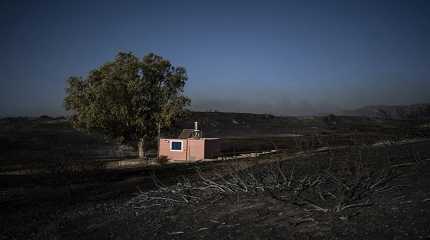
ATHENS, Greece (AP) — Authorities are maintaining an exclusion zone around an air force base in central Greece where wildfires have triggered powerful explosions at an ammunition depot.
The blasts late Thursday at the 111th Combat Wing base facilities — among the largest in the country — shattered windows in nearby towns and prompted an evacuation of more than 2,000 people, while fighter jets nearby were moved to another base.
A civilian traffic ban and evacuation order remained in effect in a 3-kilometer (2-mile) radius of the blast site.
Fueled by successive heat waves and strong gusts of wind, wildfires have raged around Greece and other Mediterranean countries over the past two weeks, scorching dozens of square kilometers of land outside Athens, on the island of Rhodes and elsewhere.
The ammunition depot blasts were broadcast live on local television reports, near the central city of Volos, one showing a ground-shaking fireball emerging from a mountainous area.
After the evacuations were ordered, residents were rushed onto private boats mobilized by the coast guard and taken to a conference center in Volos, some 20 kilometers (12.5 miles) from the weapons depot.
The explosions have not affected flights at Volos international airport, officials told the AP.
A drop in temperatures and calmer winds assisted firefighters early Friday, and all major fires were contained at midday (0600 EST/1000 GMT), Fire Service officials said.
Conditions also improved elsewhere in the Mediterranean, thanks to cooler weather after days of high heat, allowing firefighters to contain wildfires along the Croatian coast and in Sicily.
Vassilis Kikilias, the Greek minister for climate change and civil protection, said fires had burned 400 sq. kilometers (155 sq. miles) of land in July alone, while the recent average is 500 sq. kilometers (nearly 200 sq. miles) in a year.
“Is the situation any better in other countries bordering the Mediterranean? It’s a fair question ... but the answer is no,” Kikilias said.
“The climate crisis that brought us this unprecedented heat wave is here. It’s not a theory. It is our actual experience,” he said. “This is not something that will just occur this year. It will last and we have to face the consequences of what that means.”




